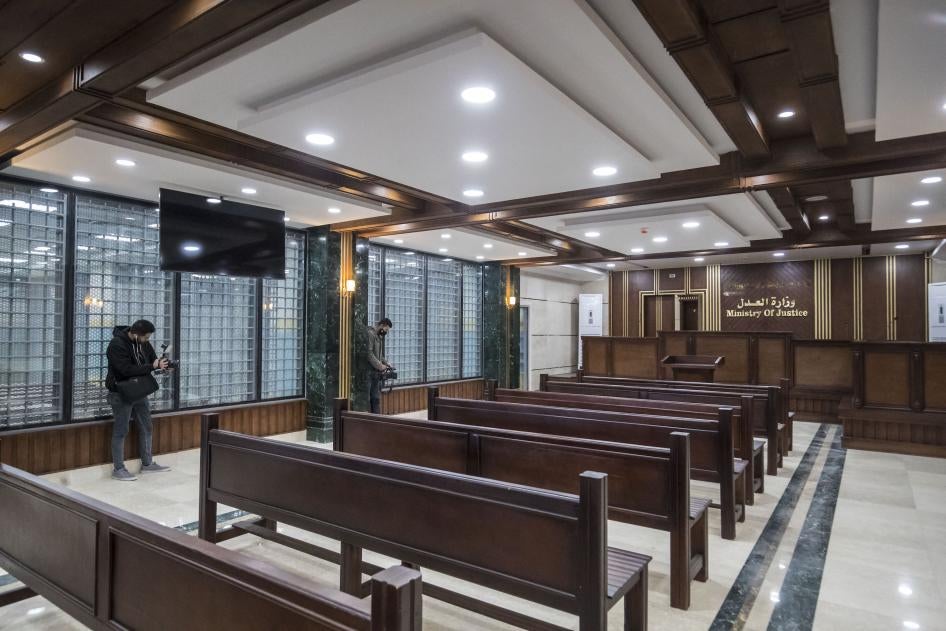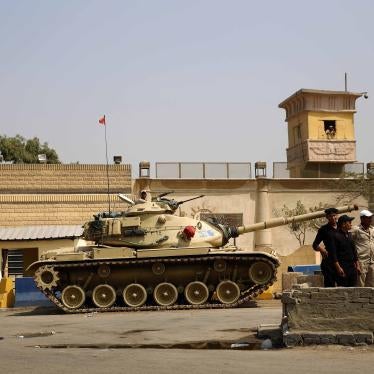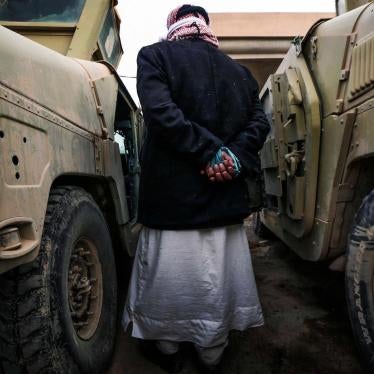(Beirut) – The Egyptian authorities have widely deployed a videoconference system since 2022 to remotely conduct pretrial detention hearings and permanently avoid bringing detainees to court in person, Human Rights Watch said today. The system is inherently abusive as it undermines detainees’ right to be brought physically before a judge to assess the legality and conditions of detention, the well-being of detainees, and for the detainees to be able to speak to the judge directly and to their lawyers in private.
The flawed videoconference system exacerbates longstanding abusive pretrial detention practices and flagrant due process violations, and effectively contributes to covering up abusive detention conditions. Vulnerable detainees remain isolated and arbitrarily denied visits or correspondence with family and lawyers for up to months or years.
“The Egyptian authorities have stifled impartial justice by undermining the requirement for a judge to review whether someone should stay in pretrial detention,” said Amr Magdi, senior Middle East and North Africa researcher at Human Rights Watch. “The authorities should scrap the remote detention renewal system, reform abusive pretrial detention practices, and guarantee due process rights.”
On December 20, 2021, Justice Minister Omar Marwan issued Decree No. 8901 of 2021, allowing judges to conduct pretrial detention renewal hearings remotely “using technology” while “observing all legal guarantees.” The decree did not explain what these guarantees entail or link using the procedure to a specific emergency or situation. According to media reports, the authorities began using the system on a limited scale beginning in October 2020, during the Covid-19 pandemic.
Human Rights Watch interviewed six Egyptian human rights lawyers who represented detainees during remote detention renewal sessions. The lawyers said that all remote hearings they attended were overseen by terrorism courts (part of the Badr criminal court) in the new Badr prison complex, east of Cairo. Human Rights Watch interviewed relatives of six people who have been in pretrial detention for up to months or years and whom authorities transferred in 2022 to Badr. The family members said that prison authorities have deprived their detained relatives of regular visits by family and lawyers, in some cases for up to eight years, as well as written or phone communication.
The Egyptian Front for Human Rights, an independent rights group, said in a 2023 report that the terrorism circuits in Badr court reviewed 25,035 pretrial detention renewal orders in 2022, mostly for offenses related to political activism. Judges upheld all but 1.4 percent of detention orders. The lawyers and family members said that for the hearings, the defendant is escorted by prison officers to one room in the prison while judges, prosecutors, and lawyers gather, without the detainees, in a courtroom. The two sides communicate using video conference technology. Lawyers said the remote hearings have removed the opportunity for confidential communication with their detained clients.
All six lawyers said that judges frequently did not allow the lawyers or detainees sufficient time to speak, and muted and silenced detainees when they attempted to complain about detention conditions. The lawyers also said that, when a case involved several detainees, judges typically reviewed the case collectively instead of addressing each detainee’s legal situation separately. Judges routinely prevent lawyers and detainees from reviewing the exact charges or the prosecution files as a longstanding practice in “state security” cases.
Such due process violations effectively deprive detainees of the right to an adequate defense and impartial judicial review of their detention, Human Rights Watch said.
Lawyers also said that because detainees attend video sessions in the presence of prison officers, they may feel that they cannot speak about detention abuses without retaliation.
Human Rights Watch and other organizations have in recent years documented that the authorities have routinely undermined the right to legal counsel by preventing lawyers’ visits. However, during past in-person court hearings, detainees inside detention cells in courtrooms sometimes had a narrow window – usually 5 to 15 minutes – to hurriedly speak with lawyers and see family members, though from behind a barrier. Relatives and lawyers said that these brief moments allowed families to get a sense of the well-being of their detained relatives when authorities prevented prison visits, but that is no longer possible under the remote hearing system.
A family member of Anas al-Beltagy, who has been in arbitrary detention for more than nine years without a criminal conviction, said that the authorities denied family visits for seven years while holding him in solitary confinement and that in-person detention renewal sessions were the only opportunity he had to leave his cell. “Since these [remote] sessions started, I know nothing about him – sometimes I ask myself if he is alive or dead,” the relative said.
Lawyers said that in several sessions, judges ended the video meeting abruptly, which terminated the entire series of hearings for that detention facility, and renewed without reviewing the detention of all remaining cases there.
One of the six lawyers said that judges in several sessions asked the prison officers to entirely remove detainees from the room where they attended the video meeting because detainees were “talking too much,” while claiming there was not time to hear everyone because of the large number of cases.
During a remote pretrial detention renewal session before Badr court in February 2022, a judge ended the video calls with detainees in Badr 1 and Abu Z’abal prisons because several detainees spoke about their dire detention conditions for roughly two minutes, said a lawyer who attended the session. On November 27 and December 21, and 28, 2022, judges also ended video calls with detainees in Badr 3 prison after detainees spoke about violations in detention, the Egyptian Front for Human Rights reported.
The Egyptian Initiative for Personal Freedoms, a leading Egyptian human rights organization, said in March that the Badr court canceled remote pretrial detention renewal sessions of detainees in Badr 3 prison for a month under the pretense of “technical issues.” This cancellation coincided with news reports that several detainees went on hunger strikes or attempted suicide due to detention conditions while being denied visits.
Human Rights Watch sent a letter with detailed questions to the offices of the justice minister and prosecutor general on April 18 but received no response.
The Human Rights Committee overseeing the International Covenant on Civil and Political Rights, to which Egypt is a party, said that people detained on criminal grounds must be brought physically before the judge, particularly if this presence would “serve the inquiry into the lawfulness of detention or where questions regarding ill-treatment of the detainee arise.” Under international law, all detainees should have the right to confidential legal assistance while being interviewed and during any other procedural actions.
Since 2014, under the government of President Abdel Fattah al-Sisi, the authorities have held tens of thousands of detainees, particularly in political cases, in prolonged arbitrary pretrial detention without presenting evidence of wrongdoing, often for merely exercising their rights to peaceful assembly and free expression. Egypt’s Criminal Procedural Code is flawed and does not meet international requirements, as it allows prosecutors, not judges, to order detention for up to 150 days. The code also allows for keeping detainees in pretrial detention for up to two years, but authorities have often kept detainees beyond that limit.
International and African human rights law require the authorities to use pretrial detention as an exception, not the rule, and only when demonstrably necessary for specific reasons, and for the shortest time possible. The defendant should be brought to trial within a reasonable time and should have the right to appear before a judge to seek a ruling on the legality and necessity of their detention.
“Instead of fixing its abusive pretrial detention laws and practices that contributed to jailing tens of thousands of people unjustly, the Egyptian authorities are using a system that prevents their contact with lawyers and family, and effectively covers up abuses against them,” Magdi said.









